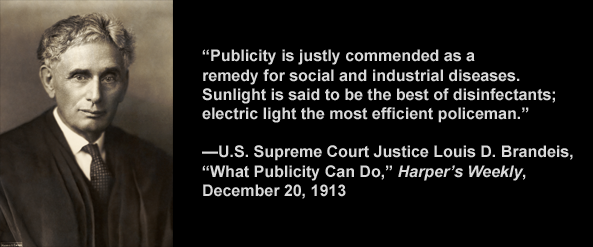Disclaimer and Federal Immunity from Liability for Posting Third-Party Content

U.S. Supreme Court Justice Louis D. Brandeis, in the public domain. (Photo credit: Harris & Ewing Collection at the Library of Congress, Prints & Photographs Division, circa 1916)
We disclaim responsibility for third-party statements and are immune from defamation liability for publishing third-party content
Disclaimer: Any individual posting a comment on the Elder Abuse Exposed.com website (e.g., a reader’s comment about a blog post by Elder Abuse Exposed.com) is the sole and original author of and is exclusively and entirely responsible for the opinions and statements in the posted comment. Furthermore, if Elder Abuse Exposed.com posts (i.e., distributes) on its website statements or material written by a third party, including, but not limited to, elder abuse victim stories and complaint investigation reports, the third party is the sole and original author of and is exclusively and entirely responsible for the statements and written material.
Elder Abuse Exposed.com disclaims all responsibility for the opinions and statements in readers’ comments and all other material that appear on the Elder Abuse Exposed.com website and that third parties have written.
With regard to third-party statements that either Elder Abuse Exposed.com or its visitors post on the Elder Abuse Exposed.com website, Elder Abuse Exposed.com is acting on its website merely as an impartial conduit for constitutionally protected free speech and as a provider and/or user of an interactive computer service (i.e., free-speech public forum).
In accordance with the “Good Samaritan” provision of the Communications Decency Act of 1996, 47 U.S.C. § 230(c)(1), “no provider or user of an interactive computer service [e.g., Elder Abuse Exposed.com] shall be treated as the publisher or speaker of any information provided by another information content provider.” Therefore, 47 U.S.C. § 230 and the following supporting case law completely immunize Elder Abuse Exposed.com and its staff from liability for and lawsuits based on offensive and allegedly defamatory statements that either Elder Abuse Exposed.com or its visitors post on its website and that third parties have written:
- Barrett v. Rosenthal, 40 Cal.4th 33, 146 P.3d 510 (Cal. Sup. Ct. 2006)
- Batzel v. Smith, 333 F.3d 1018, 1033 (9th Cir. 2003)
- Ben Ezra, Weinstein, & Co. v. America Online, Inc., 206 F.3d 980 (10th Cir. 2000)
- Blumenthal v. Drudge, 992 F. Supp. 44 (D.D.C. 1998)
- Zeran v. America Online, Inc., 129 F.3d 327 (4th Cir. 1997)
If you believe you are the victim of a libelous statement (i.e., a maliciously and factually false statement damaging your reputation) posted on the Elder Abuse Exposed.com website and originally written by a third party, you may want to:
- Email Elder Abuse Exposed.com any convincing documentation substantiating your claim. (Please note that we reserve the right, but not the obligation, to remove any third-party statements at our discretion.)
- Read the Communications Decency Act of 1996, 47 U.S.C. § 230, and the supporting case law above.
- Learn that according to the U.S. 4th Circuit Court of Appeals in Zeran v. America Online, Inc., “lawsuits seeking to hold a service provider liable for its exercise of a publisher’s traditional editorial function—such a deciding whether to publish, withdraw, postpone or alter content—are barred.”
- Learn that the landmark California Supreme Court decision in Barrett v. Rosenthal 40 Cal.4th 33 (Cal. Sup. Ct. 2006) says:
- “Plaintiffs who contend they were defamed in an Internet posting may only seek recovery from the original source of the statement.”
- “Congress intended to create a blanket immunity from tort liability for online republication of third party content.”
- “Section 230 exempts Internet intermediaries from defamation liability for republication.”
- “Section 230 has been interpreted literally. It does not permit Internet service providers or users to be sued as ‘distributors,’ nor does it expose ‘active users’ to liability.”
- “Plaintiffs are free under section 230 to pursue the originator of a defamatory Internet publication. Any further expansion of liability must await Congressional action.”
- Consult an experienced, competent attorney specializing in online defamation (i.e., cybersmear or cyberlibel) lawsuits.
- Pursue legal action against a third party who is solely responsible for the content of a posted message and who is not immune from lawsuits based on defamation by the third party.
- Determine if the state in which you want to file your libel lawsuit has adopted anti-SLAPP (strategic lawsuit against public participation) laws, which empower defendants to quickly defeat frivolous defamation lawsuits designed to intimidate and silence critics exercising their First Amendment right to free speech in a public forum.
- Study appropriate anti-SLAPP laws before you file your libel lawsuit to avoid early legal defeat and huge legal fees and costs. (In California, for instance, if you file a meritless defamation action to chill constitutionally protected free speech in a public forum, California’s anti-SLAPP statute (Code of Civil Procedure § 425.16) empowers the defendant to win an immediate dismissal of the action and forces the plaintiff to pay the defendant’s often huge attorney’s fees and costs.)


